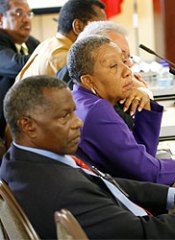- Overview
- Commonwealth initiatives
Overview
 A ministry in a Commonwealth country, as in most parts of the world, is a department or a collective of departments specialising in the administration of certain sectors of government. Key ministries within most countries include those working in foreign affairs, home affairs, defence, health, education, finance, industry and trade. Ministries in the Commonwealth are headed by a political appointee styled as ‘minister’ or ‘minister of state’ in a majority of the countries, and ‘secretary of state’ or just ‘secretary’ in a few others. Most ministers or secretaries of state are members of parliament, lords (UK only) or senators belonging to the ruling party or coalition. In some countries where there is an executive president, ordinary citizens without political office can also be ministers.
A ministry in a Commonwealth country, as in most parts of the world, is a department or a collective of departments specialising in the administration of certain sectors of government. Key ministries within most countries include those working in foreign affairs, home affairs, defence, health, education, finance, industry and trade. Ministries in the Commonwealth are headed by a political appointee styled as ‘minister’ or ‘minister of state’ in a majority of the countries, and ‘secretary of state’ or just ‘secretary’ in a few others. Most ministers or secretaries of state are members of parliament, lords (UK only) or senators belonging to the ruling party or coalition. In some countries where there is an executive president, ordinary citizens without political office can also be ministers.
‘Permanent secretary’ is the title given to the civil (or public) service administrative head for each ministry in most Commonwealth countries, a non-political appointee. Exceptions of how administrative heads of ministries are entitled include ‘director-general’ (in Ghana and South Africa), ‘deputy minister’ (Canada), ‘chief executive officer’ (New Zealand and Nauru), ‘secretary’ (Pakistan, Bangladesh, India and Sri Lanka), ‘principal secretary’ (Lesotho, Malawi and Swaziland), ‘secretary-general’ (Cameroon and Malaysia) and ‘departmental secretary’ (Australia).
Commonwealth initiatives

Every two to three years, member countries take turns to host Commonwealth Ministers’ Meetings where ministers, administrative heads of ministries, senior officials and stakeholders working in specialised spheres of government – for example health, education, finance and tourism – exchange ideas and collaborate on best practice and discuss Commonwealth policies and programmes. The Commonwealth Education Ministers’ Meeting (CCEM) is perhaps the largest with over a thousand delegates attending each conference. The next CCEM takes place in Bahamas in 2015.
In November 1995, Commonwealth Heads of Government created the Commonwealth Ministerial Action Group (CMAG) to deal with serious or persistent violations of the Harare Declaration, which lays down the Commonwealth’s core principles and values. CMAG is made up nominally of nine foreign ministers from around the Commonwealth and is convened by the Commonwealth Secretary General. CMAG’s task is to assess the nature of the infringement of Commonwealth principles and recommend measures for collective action aimed at the speedy restoration of democracy and constitutional rule. CMAG’s authority to suspend a member country from the association is unique amongst international organisations.


